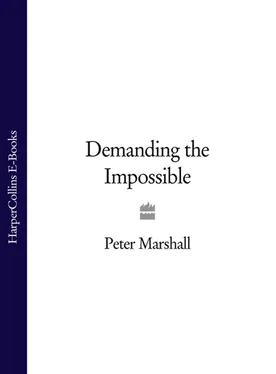The dominant language and culture in a society tend to reflect the values and ideas of those in power. Anarchists more than most have been victims of the tyranny of fixed meanings, and have been caught up in what Thomas Paine called the ‘Bastille of the word’. But it is easy to see why rulers should fear anarchy and wish to label anarchists as destructive fanatics for they question the very foundations of their rule. The word ‘anarchy’ comes from the ancient Greek αναϱχια meaning the condition of being ‘without a leader’ but usually translated and interpreted as ‘without a ruler’. From the beginning, it made sense for rulers to tell their subjects that without their rule there would be tumult and mayhem; as Yeats wrote: ‘Things fall apart; the centre cannot hold;/Mere anarchy is loosed upon the world.’ 3 In the same way, upholders of law argued that a state of ‘lawlessness’ would mean turmoil, licence and violence. Governments with known laws are therefore necessary to maintain order and calm.
But it became increasingly clear to bold and independent reasoners that while States and governments were theoretically intended to prevent injustice, they had in fact only perpetuated oppression and inequality. The State with its coercive apparatus of law, courts, prisons and army came to be seen not as the remedy for but rather the principal cause of social disorder. Such unorthodox thinkers went still further to make the outlandish suggestion that a society without rulers would not fall into a condition of chaotic unruliness, but might produce the most desirable form of ordered human existence.
The ‘state of nature’, or society without government, need not after all be Hobbes’ nightmare of permanent war of all against all, but rather a condition of peaceful and productive living. Indeed, it would seem closer to Locke’s state of nature in which people live together in a state of ‘perfect freedom to order their actions’, within the bounds of the law of nature, and live ‘according to reason, without a common superior on earth, with authority to judge between them’. 4 Anarchists merely reject Locke’s suggestion that in such a condition the enjoyment of life and property would be necessarily uncertain or inconvenient.
For this reason, Pierre-Joseph Proudhon, the first self-styled anarchist, writing in the nineteenth century, launched the apparent paradox: ‘Anarchy is Order.’ Its revolutionary import has echoed ever since, filling rulers with fear, since they might be made obsolete, and inspiring the dispossessed and the thoughtful with hope, since they can imagine a time when they might be free to govern themselves.
The historic anarchist movement reached its highest point to date in two of the major revolutions of the twentieth century – the Russian and the Spanish. In the Russian Revolution, anarchists tried to give real meaning to the slogan ‘All Power to the Soviets’, and in many parts, particularly in the Ukraine, they established free communes. But as the Bolsheviks concentrated their power, the anarchists began to lose ground. Trotsky, as head of the Red Army, crushed the anarchist movement led by Nestor Makhno in the Ukraine, and then put down the last great libertarian uprising of sailors and workers known as the Kronstadt Mutiny in 1921.
By far the greatest anarchist experiment took place in Spain in the 1930s. At the beginning of the Spanish Civil War, peasants, especially in Andalucía, Aragón and Valencia, set up with fervour a network of collectives in thousands of villages. In Catalunya, the most highly developed industrial part of Spain, anarchists managed the industries through workers’ collectives based on the principles of self-management. George Orwell has left a remarkable account of the revolutionary atmosphere in his Homage to Catalonia (1938). But the intervention of fascist Italy and Germany on the side of Franco and his rebels, and the policy of the Soviet Union to funnel its limited supply of arms through the Communists, meant that the experiment was doomed. Communists and anarchists fought each other in Barcelona in 1937, and Franco triumphed soon after. Millions of Spanish anarchists went underground or lost their way.
The Second World War which followed shattered the international anarchist movement, and the most dedicated were reduced to running small magazines and recording past glories. Only Gandhi’s strategy of civil disobedience used to oust the British from India and his vision of a decentralized society based on autonomous villages seemed to show a libertarian glimmer. When George Woodcock wrote his history of anarchism at the beginning of the 1960s, he sadly concluded that the anarchist movement was a lost cause and that the anarchist ideal could principally help us ‘to judge our condition and see our aims’. 5 The historian James Joll also struck an elegiac note soon after and announced the failure of anarchism as ‘a serious political and social force’, while the sociologist Irving Horowitz argued that it was ‘foredoomed to failure’. 6
Events soon proved them wrong. Anarchism as a volcano of values and ideas was dormant, not extinct. The sixties saw a remarkable revival, although in an unprecedented and more diffuse form. Many of the themes of the New Left – decentralization, workers’ control, participatory democracy – were central anarchist concerns. Thoughtful Marxists like E. P. Thompson began to call themselves ‘libertarian’ socialists in order to distance themselves from the authoritarian tactics of vanguard parties. The growth of the counter-culture, based on individuality, community, and joy, expressed a profound anarchist sensibility, if not a self-conscious knowledge. Once again, it became realistic to demand the impossible.
Tired of the impersonality of monolithic institutions, the hollow trickery of careerist politics, and the grey monotony of work, disaffected middle-class youth raised the black flag of anarchy in London, Paris, Amsterdam, Berlin, Chicago, Mexico City, Buenos Aires, and Tokyo. In 1968 the student rebellions were of libertarian inspiration. In Paris street posters declared paradoxically ‘Be realistic: Demand the impossible’, ‘It is forbidden to forbid’ and ‘Imagination is seizing power’. The Situationists called for a thorough transformation of everyday life. The Provos and then the Kabouters in Holland carried on the tradition of creative confrontation. The spontaneous uprisings and confrontations at this time showed how vulnerable modern centralized States could be.
The historians took note. Daniel Guérin’s lively L’Anarchisme: de la doctrine à l‘action (1965) both reflected and helped develop the growing libertarian sensibility of the 1960s: it became a best-seller and was translated into many languages. Guérin concluded that it might well be State communism, and not anarchism, which was out of step with the needs of the contemporary world, and felt his prediction fully vindicated by the events of 1968 in Prague and Paris. 7 Joll was obliged to acknowledge that anarchism was still a living tradition and not merely of psychological or historical interest. 8 Woodcock too confessed that he had been too hasty in pronouncing anarchism to be moribund. Indeed, far from being in its death throes, it had become ‘a phoenix in an awakening desert’. 9
The hoped-for transformation of everyday life did not occur in the seventies, but the anarchist influence continued to reveal itself in the many experiments in communal living in Europe and North America which attempted to create free zones within the Corporate State. The movement for workers’ control and self-management echoed the principles of early anarcho-syndicalism. The peace and women’s movements have all been impressed by the anarchist critique of domination and hierarchy, and have adopted to different degrees the anarchist emphasis on direct action and participatory democracy. The Green movement is anarchist in its desire to decentralize the economy and to dissolve personal and political power. Anarchists are influential in the fields of education, trade unions, community planning and culture. The recent trend towards more militarized, centralized and secretive governments has created a counter-movement of people who challenge authority and insist on thinking for themselves.
Читать дальше












